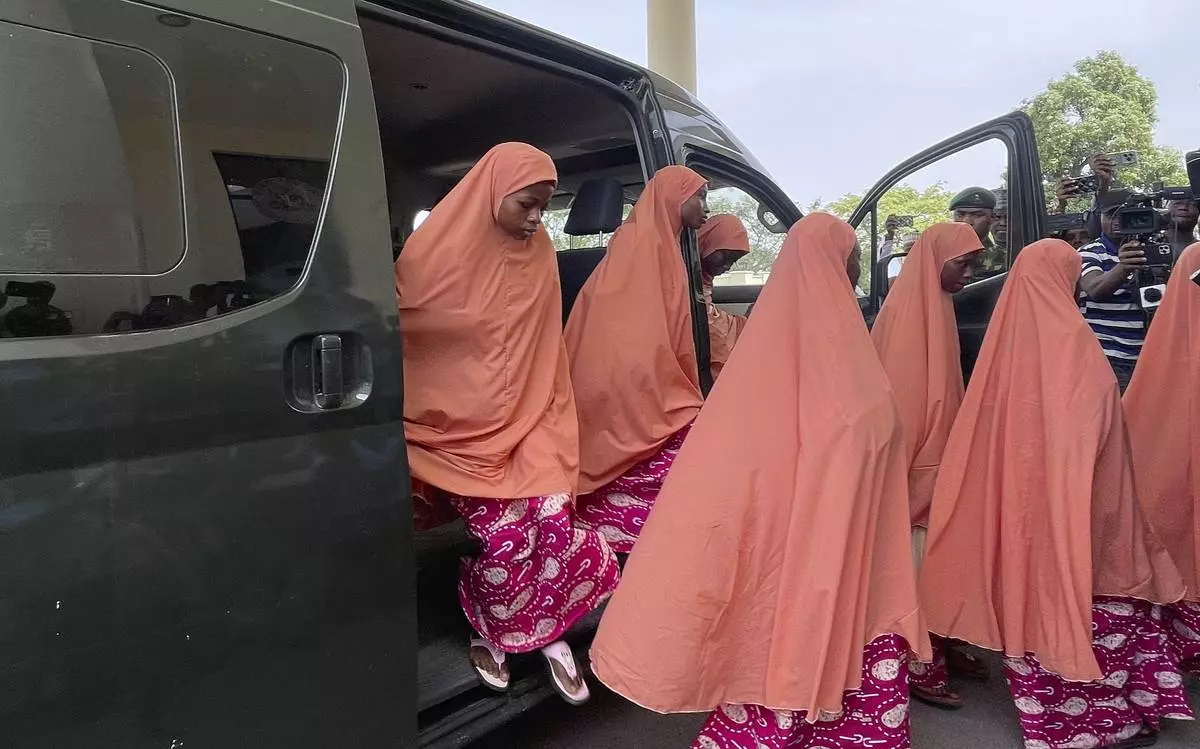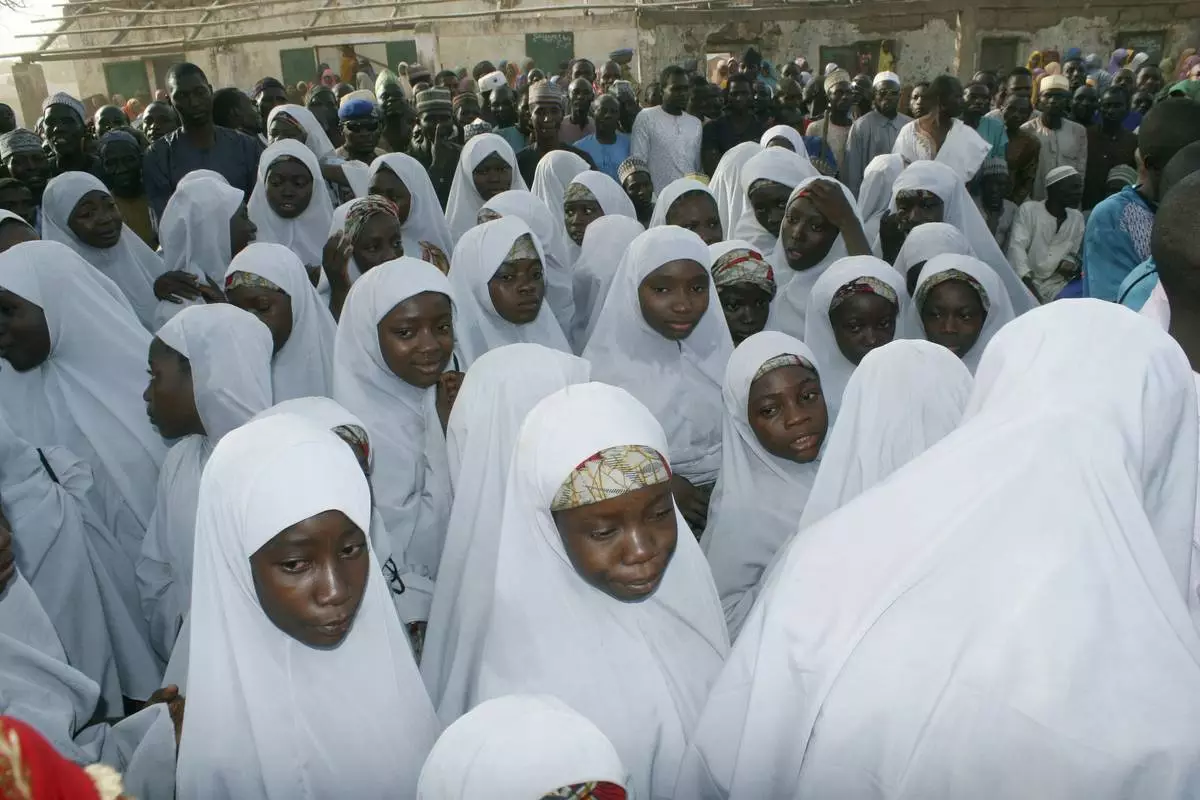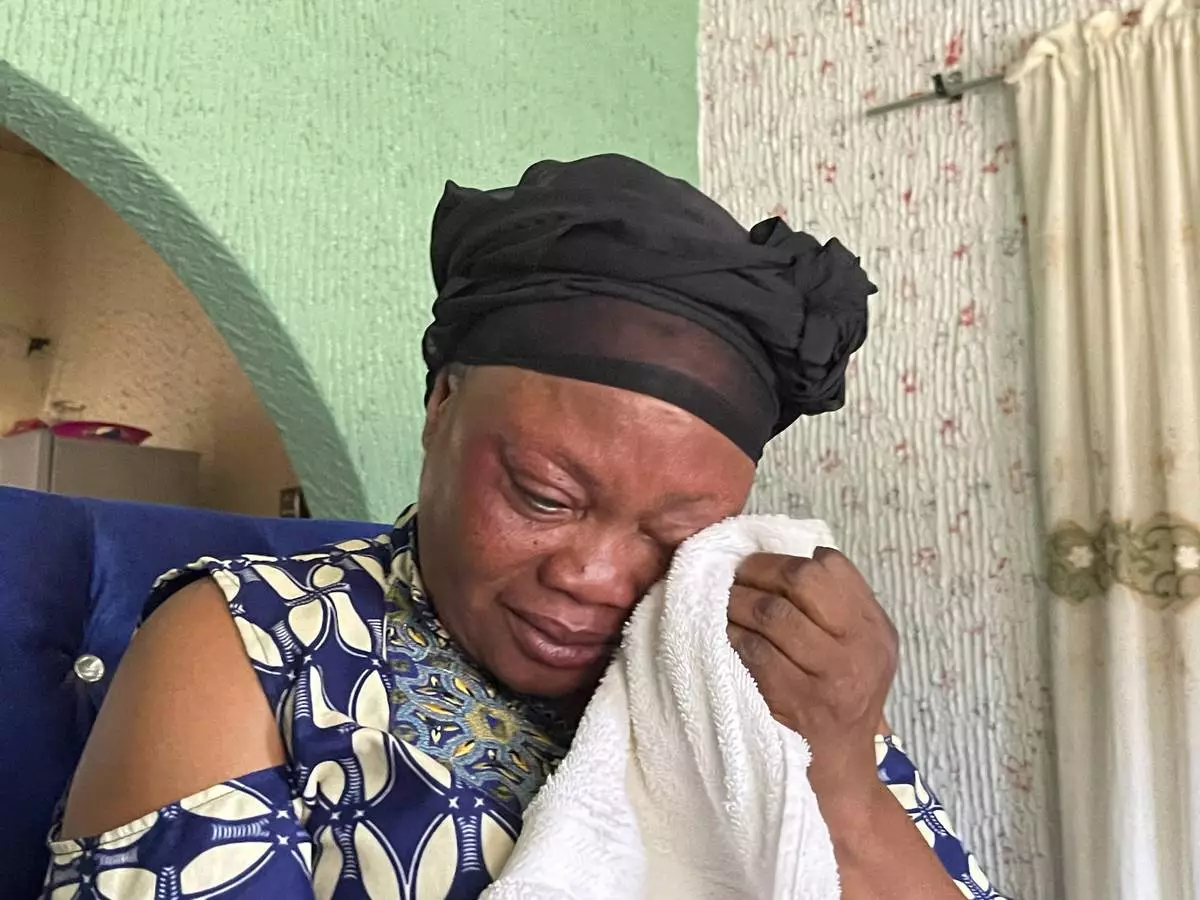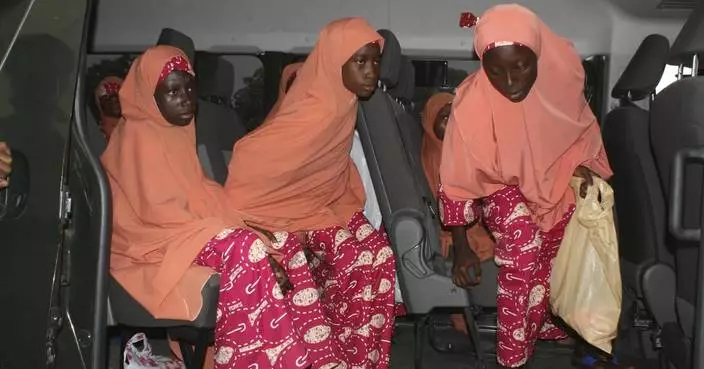Japanese schoolchildren will help determine the mascot for the Tokyo 2020 Olympics.
Organizers of the Tokyo Olympics and Paralympics on Thursday unveiled three sets of designs for the games' mascots. The 6.5 million schoolchildren will review the shortlisted designs with their classes casting a single vote in favor of one of the three sets.

Children and officials of Tokyo 2020 pose for photographers with cutouts of shortlisted three mascot design sets which each contain one mascot for the Tokyo Olympic Games and one for the Paralympic Games, at an elementary school in Tokyo Thursday, Dec. 7, 2017. .(AP Photo/Eugene Hoshiko)
The three finalists were selected from among 2,042 entries submitted by the public, with the winner to be announced on Feb. 28.

Photo via Tokyo 2020
The first set is a pair of humanoid characters clad in the 'ichimatsu" checkered pattern of the Games' official logo.

Children unveil the shortlisted three mascot design sets which each contain one mascot for the Tokyo 2020 Olympic Games and one for the Paralympic Games at an elementary school in Tokyo Thursday, Dec. 7, 2017. (AP Photo/Eugene Hoshiko)

Chidlren pose for photographers in front of the shortlisted three mascot design sets which each contain one mascot for the Tokyo 2020 Olympic Games and one for the Paralympic Games at an elementary school in Tokyo Thursday, Dec. 7, 2017. (AP Photo/Eugene Hoshiko)
The second set features a "maneki neko" (good-luck cat) and a fox commonly seen at Shinto shrines. The third set features a fox and a dog with gold ribbons on their backs.
The Tokyo Olympics are scheduled for July 24 to Aug. 9, 2020.
KADUNA, Nigeria (AP) — His weak body stood in the doorway, exhausted and covered in dirt. For two years, the boy had been among Nigeria’s ghosts, one of at least 1,500 schoolchildren and others seized by armed groups and held for ransom.
But paying a ransom didn't work for 12-year-old Treasure, the only captive held back from the more than 100 schoolchildren kidnapped from their school in July 2021 in the northwestern Kaduna state. Instead, his captors hung on, and he had to escape the forests on his own in November.
Treasure's ordeal is part of a worrying new development in Nigeria, Africa's most populous country where the mass abduction of 276 Chibok schoolgirls a decade ago marked a new era of fear —with nearly 100 of the girls still in captivity. Since the Chibok abductions, at least 1,500 students have been kidnapped, as armed groups increasingly find in them a lucrative way to fund other crimes and control villages in the nation's mineral-rich but poorly policed northwestern region.
The Associated Press spoke with five families whose children have been taken hostage in recent years and witnessed a pattern of trauma and struggle with education among the children. Parents are becoming more reluctant to send their children to school in parts of northern Nigeria, worsening the education crisis in a country of over 200 million where at least 10 million children are out of school — one of the world's highest rates.
The AP could not speak with Treasure, who is undergoing therapy after escaping captivity in November. His relatives, however, were interviewed at their home in Kaduna state, including Jennifer, his cousin, who was also kidnapped when her boarding school was attacked in March 2021.
“I have not recovered, my family has not recovered (and) Treasure barely talks about it,” said Jennifer, 26, as her mother sobbed beside her. “I don’t think life will ever be the same after all the experience,” she added.
Unlike the Islamic extremists that staged the Chibok kidnappings, the deadly criminal gangs terrorizing villages in northwestern Nigeria are mostly former herdsmen who were in conflict with farming host communities, according to authorities. Aided by arms smuggled through Nigeria’s porous borders, they operate with no centralized leadership structure and launch attacks driven mostly by economic motive.
Some analysts see school kidnappings as a symptom of Nigeria’s worsening security crisis.
According to Nigerian research firm SBM Intelligence, nearly 2,000 people have been abducted in exchange for ransoms this year. However, armed gangs find the kidnapping of schoolchildren a “more lucrative way of getting attention and collecting bigger ransoms,” said Rev. John Hayab, a former chairman of the local Christian association in Kaduna who has often helped to secure the release of abducted schoolchildren like Treasure.
The security lapses that resulted in the Chibok kidnappings 10 years ago remain in place in many schools, according to a recent survey by the United Nations children’s agency’s Nigeria office, which found that only 43% of minimum safety standards such as perimeter fencing and guards are met in over 6,000 surveyed schools.
Bola Tinubu, who was elected president in March 2023, had promised to end the kidnappings while on the campaign trail. Nearly a year into his tenure there is still “a lack of will and urgency and a failure to realize the gravity of the situation, or to respond to it,” said Nnamdi Obasi, senior adviser for Nigeria at the International Crisis Group.
“There is no focused attention or commitment of resources on this emergency,” he added.
Treasure was the youngest of more than 100 children seized from the Bethel Baptist High School in the Chikun area of Kaduna in 2021. After receiving ransoms and freeing the other children in batches, his captors vowed to keep him, said Rev. Hayab.
That didn't stop his family from clinging to hope that he would one day return home alive. His grandmother, Mary Peter, remembers the night he returned home, agitated and hungry.
"He told us he was hungry and wanted to eat,” she said of Treasure's first words that night after two years and three months in captivity.
“Treasure went through hell,” said Rev. Hayab with the Christian association. “We need to work hard to get him out of ... what he saw, whatever he experienced."
Nigerian lawmakers in 2022 outlawed ransom payments, but desperate families continue to pay, knowing kidnappers can be ruthless, sometimes killing their victims when their relatives delay ransom payments often delivered in cash at designated locations.
And sometimes, even paying a ransom does not guarantee freedom. Some victims have accused security forces of not doing anything to arrest the kidnappers even after providing information about their calls and where their hostages were held.
Such was the experience of Treasure's uncle Emmanuel Audu, who was seized and chained to a tree for more than a week after he had gone to deliver the ransom demanded for his nephew to be freed.
Audu and other hostages were held in Kaduna’s notorious Davin Rugu forest. Once a bustling forest reserve that was home to wild animals and tourists, it is now one of the bandit enclaves in the ungoverned and vast woodlands tucked between mountainous terrains and stretching across thousands of kilometers as they connect states in the troubled region.
“The whole forest is occupied by kidnappers and terrorists,” Audu said as he talked about his time in captivity. His account was corroborated by several other kidnap victims and analysts.
Some of his captors in the forest were boys as young as Treasure, a hint of what his nephew could have become, and a sign that a new generation of kidnappers is already emerging.
"They beat us mercilessly. When you faint, they will flog you till you wake up,” he said, raising his hand to show the scars that reminded him of life in captivity.
No one in the Peter family recovered after their experience with kidnapping.
Jennifer says she rarely sleeps well even though it's been almost three years since she was freed by her captors. Her mother, a food trader, is finding it hard to raise capital again for her business after using most of her savings and assets inherited from her late husband to pay for ransoms.
Therapy is so costly, that the church had to sponsor that of Treasure while other members of the family are left to endure and hope they eventually get over their experiences.
“Sometimes, when I think about what happened, I wish I did not go to school,” said Jennifer with a rueful grin. “I just feel sorry for the children that are still in boarding school because it is not safe. They are the main target.”
The Associated Press receives financial support for global health and development coverage in Africa from the Bill & Melinda Gates Foundation Trust. The AP is solely responsible for all content. Find AP’s standards for working with philanthropies, a list of supporters and funded coverage areas at AP.org.
Find more of AP's Africa coverage at https://apnews.com/hub/africa

FILE - A group of men identified by Nigerian police as Boko Haram extremist fighters and leaders are shown to the media, in Maiduguri, Nigeria, Wednesday, July 18, 2018. His experience represents a worrying new development in Nigeria, Africa's most populous country where the mass abduction of Chibok schoolgirls a decade ago marked a new era of fear even as nearly 100 of the girls remain in captivity. An array of armed groups now focus on abducting schoolchildren, seeing in them a lucrative way to fund other crimes and control villages in the nation's mineral-rich but poorly-policed northwestern region.(AP Photo/Jossy Ola, File)

FILE- People gather to welcome then-recently freed students of the LEA Primary and Secondary School Kuriga upon arrival to reunite with there parents in Kuriga, Nigeria, Thursday, March 28, 2024. Their experience represents a worrying new development in Nigeria, Africa's most populous country where the mass abduction of Chibok schoolgirls a decade ago marked a new era of fear even as nearly 100 of the girls remain in captivity. An array of armed groups now focus on abducting schoolchildren, seeing in them a lucrative way to fund other crimes and control villages in the nation's mineral-rich but poorly-policed northwestern region. (AP Photo/Olalekan Richard, File)

FILE - Security walk past the burned government secondary school Chibok where gunmen abducted more than 200 students in Chibok, Nigeria, Monday, April, 21. 2014. In Nigeria, Africa's most populous country, the mass abduction of Chibok schoolgirls a decade ago marked a new era of fear even as nearly 100 of the girls remain in captivity. An array of armed groups now focus on abducting schoolchildren, seeing in them a lucrative way to fund other crimes and control villages in the nation's mineral-rich but poorly-policed northwestern region. (AP Photo/ Haruna Umar, File)

FILE - Freed students of the LEA Primary and Secondary School Kuriga sit upon their arrival at the state government house in Kaduna, Nigeria, Monday, March 25, 2024. Their experience represents a worrying new development in Nigeria, Africa's most populous country where the mass abduction of Chibok schoolgirls a decade ago marked a new era of fear even as nearly 100 of the girls remain in captivity. An array of armed groups now focus on abducting schoolchildren, seeing in them a lucrative way to fund other crimes and control villages in the nation's mineral-rich but poorly-policed northwestern region. (AP Photo/Habila Darofai, File)

FILE- Then-recently freed Chibok schoolgirls sit with their children at the Army Maimalari Cantonment in Maiduguri, Nigeria, Thursday, May 4, 2023. Their experience represents a worrying new development in Nigeria, Africa's most populous country where the mass abduction of Chibok schoolgirls a decade ago marked a new era of fear even as nearly 100 of the girls remain in captivity. An array of armed groups now focus on abducting schoolchildren, seeing in them a lucrative way to fund other crimes and control villages in the nation's mineral-rich but poorly-policed northwestern region. (AP Photo/Jossy Ola, File)

FILE - Some of the escaped kidnapped girls of the government secondary school Chibok arrive for a meeting with Borno state governor, in Maiduguri, Nigeria, Monday June, 2. 2014. Their experience represents a worrying new development in Nigeria, Africa's most populous country where the mass abduction of Chibok schoolgirls a decade ago marked a new era of fear even as nearly 100 of the girls remain in captivity. An array of armed groups now focus on abducting schoolchildren, seeing in them a lucrative way to fund other crimes and control villages in the nation's mineral-rich but poorly-policed northwestern region. (AP Photo/Jossy Ola, File)

FILE - Freed students of the LEA Primary and Secondary School Kuriga leave a van upon arrival at the government house in Kaduna, Nigeria, Monday, March 25, 2024. Their experience represents a worrying new development in Nigeria, Africa's most populous country where the mass abduction of Chibok schoolgirls a decade ago marked a new era of fear even as nearly 100 of the girls remain in captivity. An array of armed groups now focus on abducting schoolchildren, seeing in them a lucrative way to fund other crimes and control villages in the nation's mineral-rich but poorly-policed northwestern region. (AP Photo/Chinedu Asadu, File)

FILE - Then-recently freed students of the LEA Primary and Secondary School Kuriga gather upon arrival to reunite with their parents after more than two weeks in captivity, in Kuriga, Nigeria, Thursday, March 28, 2024. Their experience represents a worrying new development in Nigeria, Africa's most populous country where the mass abduction of Chibok schoolgirls a decade ago marked a new era of fear even as nearly 100 of the girls remain in captivity. An array of armed groups now focus on abducting schoolchildren, seeing in them a lucrative way to fund other crimes and control villages in the nation's mineral-rich but poorly-policed northwestern region. (AP Photo/Olalekan Richard, File)

FILE - Chibok schoolgirls, freed some years ago from Nigeria extremist captivity, are seen in Abuja, Nigeria. Monday May 8, 2017. Their experience represents a worrying new development in Nigeria, Africa's most populous country where the mass abduction of Chibok schoolgirls a decade ago marked a new era of fear even as nearly 100 of the girls remain in captivity. An array of armed groups now focus on abducting schoolchildren, seeing in them a lucrative way to fund other crimes and control villages in the nation's mineral-rich but poorly-policed northwestern region. (AP Photo/Sunday Alamba, File)

FILE - Chibok schoolgirls freed from Boko Haram captivity are seen in Abuja, Nigeria, Sunday May 7, 2017. Seven years after Boko Haram extremists abducted more than 270 schoolgirls in northeast Nigeria, two of the more than 100 still being held by the rebels returned this month, renewing the hope of parents who have all but given up on the long wait for the return of their children. Some of the affected parents said they remain hopeful that they will reunite with their children in Borno State, where the Boko Haram insurgency has lasted for more than a decade. (AP Photo/ Olamikan Gbemiga, File)

FILE- Jummai Mutah, left, and Amina Ali, Chibok schoolgirls who were kidnapped in 2014 by Islamic extremists and later released, attend a 10th anniversary event of the abduction in Lagos, Nigeria, Thursday, April 4, 2024. Their experience represents a worrying new development in Nigeria, Africa's most populous country where the mass abduction of Chibok schoolgirls a decade ago marked a new era of fear even as nearly 100 of the girls remain in captivity. An array of armed groups now focus on abducting schoolchildren, seeing in them a lucrative way to fund other crimes and control villages in the nation's mineral-rich but poorly-policed northwestern region. (AP Photo/Mansur Ibrahim, File )

Mary Peter, mother of Jennifer Peter, who was kidnapped with others in her school by gunmen in March 2021, listens to a question during an interview with The Associated Press in Kaduna, Nigeria, Tuesday , March, 26, 2024. The gunmen who kidnapped Jennifer Peter and dozens of her peers from school in March 2021 returned months later to attack another school in her state in northwestern Nigeria. The second time, they seized over 100 children including Jennifer's 10-year-old cousin, Treasure, who was held captive for more than two years. (AP Photo/Chinedu Asadu)

Mary Peter, mother of Jennifer Peter, who was kidnapped with others in her school by gunmen in March 2021, sobs during an interview with The Associated Press in Kaduna, Nigeria, Tuesday, March, 26, 2024. The gunmen who kidnapped Jennifer Peter and dozens of her peers from school in March 2021 returned months later to attack another school in her state in northwestern Nigeria. The second time, they seized over 100 children including Jennifer's 10-year-old cousin, Treasure, who was held captive for more than two years. (AP Photo/Chinedu Asadu)

Jennifer Peter, who was kidnapped with others in her school by gunmen in March 2021, play with her mobile phone in Kaduna, Nigeria, Tuesday , March, 26, 2024. The gunmen who kidnapped Jennifer Peter and dozens of her peers from school in March 2021 returned months later to attack another school in her state in northwestern Nigeria. The second time, they seized over 100 children including Jennifer's 10-year-old cousin, Treasure, who was held captive for more than two years. (AP Photo/Chinedu Asadu)

Jennifer Peter, who was kidnapped with others in her school by gunmen in March 2021, speaks during an interview in Kaduna, Nigeria, Tuesday, March, 26, 2024. The gunmen who kidnapped Jennifer Peter and dozens of her peers from school in March 2021 returned months later to attack another school in her state in northwestern Nigeria. The second time, they seized over 100 children including Jennifer's 10-year-old cousin, Treasure, who was held captive for more than two years. (AP Photo/Chinedu Asadu)























